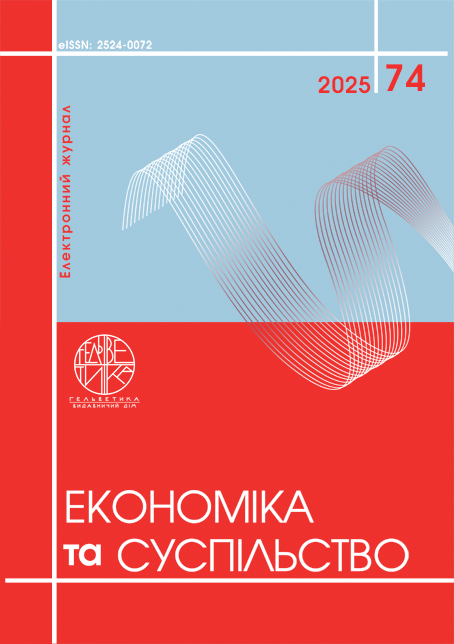ОСОБЛИВОСТІ БУХГАЛТЕРСЬКОГО ОБЛІКУ ЛОГІСТИЧНИХ ВИТРАТ ПІДПРИЄМСТВ
Анотація
Стаття присвячена дослідженню особливостей бухгалтерського обліку логістичних витрат підприємства. У статті розглядаються актуальні проблеми обліку логістичних витрат на підприємствах в умовах сучасної економіки. Запропоновано напрями удосконалення системи бухгалтерського обліку логістичних витрат із урахуванням принципів прозорості, достовірності й ефективності управління витратами. Обґрунтовано доцільність деталізації витрат, інтеграції з цифровими технологіями та поєднання фінансового й управлінського обліку. Окрему увагу приділено ролі логістичних витрат у формуванні собівартості продукції, товарів та послуг, а також їх впливу на фінансові результати. Запропоновано шляхи удосконалення обліку логістичних витрат з урахуванням сучасних технологій управління процесами постачання.
Посилання
Положення (стандарт) бухгалтерського обліку 16 «Витрати». URL: https://zakon.rada.gov.ua/laws/show/z0027-00 (дата звернення 15.05.2025).
Бутинець Ф. Ф. Бухгалтерський облік в Україні: підручник. Житомир. ПП «Рута», 2020. 848 с.
Сопко В. В., Гуторов А. М. Бухгалтерський облік: підручник. К. Центр учбової літератури, 2019. 520 с.
Крикавський Є. В. Логістика: навч. посіб. 3-тє вид., допов. Львів: НУ «Львівська політехніка», 2018. 456 с.
Чебан О. В. Особливості обліку витрат на логістику підприємства. Економіка і організація управління. 2023. № 1. С. 85–91.
Романюк Н. І. Управління логістичними витратами: економіко-обліковий аспект. Фінанси, облік і аудит. 2022. № 30. С. 102–107.
Гуцайлюк З. В. Облік витрат в управлінні логістичною діяльністю підприємства. Облік і фінанси. 2021. № 4(94). С. 58–63.
Сергієнко О. І. Логістика у системі економічної безпеки підприємства. Вісник економіки транспорту і промисловості. 2020. № 70. С. 117–123.
Діброва Т. П. Витрати підприємства: облік, контроль, аналіз : монографія К.: КНЕУ. 2019. 352 с.
Савчук В. І. Методичні підходи до калькулювання логістичних витрат. Бізнес Інформ. 2020. № 3. С. 147–153.
Яремко І. Й. Класифікація витрат як основа організації обліку і контролю логістичної діяльності підприємства. Економіка і суспільство. 2024. № 64.
Ministry of Finance of Ukraine. (1999). Accounting Standard 16 «Expenses». Retrieved May 15, 2025, from https://zakon.rada.gov.ua/laws/show/z0027-00 (accessed April 15, 2025).
Butynets, F. F. (2020). Bukhhalterskyi oblik v Ukraini: pidruchnyk [Accounting in Ukraine: textbook]. Zhytomyr: Ruta, 848 p. (in Ukrainian).
Sopko, V. V., & Hutorov, A. M. (2019). Bukhhalterskyi oblik: pidruchnyk [Accounting: textbook]. Kyiv: Tsentr uchbovoi literatury, 520 p. (in Ukrainian).
Krykavskyi, Ye. V. (2018). Lohistyka: navchalnyi posibnyk [Logistics: educational manual] (3rd ed.). Lviv: National University «Lviv Polytechnic», 456 p. (in Ukrainian).
Cheban, O. V. (2023). Osoblyvosti obliku vytrat na lohistyku pidpryiemstva [Features of accounting for logistics costs at the enterprise]. Ekonomika i orhanizatsiia upravlinnia, vol .(1), pp. 85–91.
Romaniuk, N. I. (2022). Upravlinnia lohistychnymy vytratamy: ekonomiko-oblikovyi aspekt [Management of logistics costs: Economic and accounting aspect]. Finansy, oblik i audyt, vol . (30), pp. 102–107.
Hutsailiuk, Z. V. (2021). Oblik vytrat v upravlinni lohistychnoiu diialnistiu pidpryiemstva [Accounting of costs in the management of logistics activities of the enterprise]. Oblik i finansy, vol . 4(94), pp. 58–63.
Serhiienko, O. I. (2020). Lohistyka u systemi ekonomichnoi bezpeky pidpryiemstva [Logistics in the system of economic security of the enterprise]. Visnyk ekonomiky transportu i promyslovosti, vol . (70), pp.117–123.
Dibrova, T. P. (2019). Vytraty pidpryiemstva: oblik, kontrol, analiz: monohrafiia [Enterprise expenses: Accounting, control, analysis: monograph] Kyiv: KNEU, 352 p. (in Ukrainian)
Savchuk, V. I. (2020). Metodychni pidkhody do kalkuliuvannia lohistychnykh vytrat [Methodological approaches to logistics cost calculation]. Biznes Inform, vol . (3), pp. 147–153.
Yaremko, I. Y. (2024). [Classification of expenses as a basis for organizing accounting and control of enterprise logistics activity]. Ekonomika i suspilstvo, vol. (64), pp.117–123.

Ця робота ліцензується відповідно до Creative Commons Attribution 4.0 International License.


